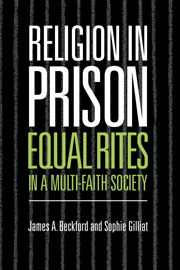Book contents
- Frontmatter
- Contents
- List of figures
- List of tables
- Abbreviations
- Preface
- 1 Equal opportunities and multiculturalism in prisons
- 2 Chaplaincy, chaplains, chapels and other faiths
- 3 Church of England prison chaplains
- 4 Visiting Ministers of other faiths
- 5 ‘Facilitation’ or ‘dependence’?
- 6 Inclusion and exclusion
- 7 Prison chaplaincy in the United States
- 8 Conclusions: state, church and diversity
- Notes
- Appendix
- References
- Index
3 - Church of England prison chaplains
Published online by Cambridge University Press: 22 August 2009
- Frontmatter
- Contents
- List of figures
- List of tables
- Abbreviations
- Preface
- 1 Equal opportunities and multiculturalism in prisons
- 2 Chaplaincy, chaplains, chapels and other faiths
- 3 Church of England prison chaplains
- 4 Visiting Ministers of other faiths
- 5 ‘Facilitation’ or ‘dependence’?
- 6 Inclusion and exclusion
- 7 Prison chaplaincy in the United States
- 8 Conclusions: state, church and diversity
- Notes
- Appendix
- References
- Index
Summary
Church of England chaplains tend to hold most of the administrative responsibility for prison chaplaincy programmes. This is true at the level of the Prison Service Chaplaincy (PSC) headquarters in London, at the regional level as well as at the level of individual prison establishments. The reasons for the Anglican ascendancy have their roots in a complex mixture of history, statute, custom and expediency, as we explained in chapter 2. Even in cases where Church of England chaplains enthusiastically share the overall responsibility with fellow-chaplains from the Roman Catholic Church or the Methodist Church, other members of prison staff still tend to regard the Anglican as ‘normally’ or ‘naturally’ in charge of affairs. And, given that more than 80 per cent of all full-time chaplains are indeed Anglicans, and are therefore available more often than others, it is clear why they are usually expected to act as managers and representatives of chaplaincy when the need arises for someone to fill this role. This is a very important consideration, for the Prison Service places a premium on accountability in its distinctly hierarchical form of organisation.
The questions which run through this chapter have to do with the extent to which the training and prior work experience of Church of England chaplains prepare them for the kind of managerial responsibility which most of them come to exercise and for the work which they do on behalf of, or in conjunction with, members of other faiths.
- Type
- Chapter
- Information
- Religion in Prison'Equal Rites' in a Multi-Faith Society, pp. 56 - 88Publisher: Cambridge University PressPrint publication year: 1998



